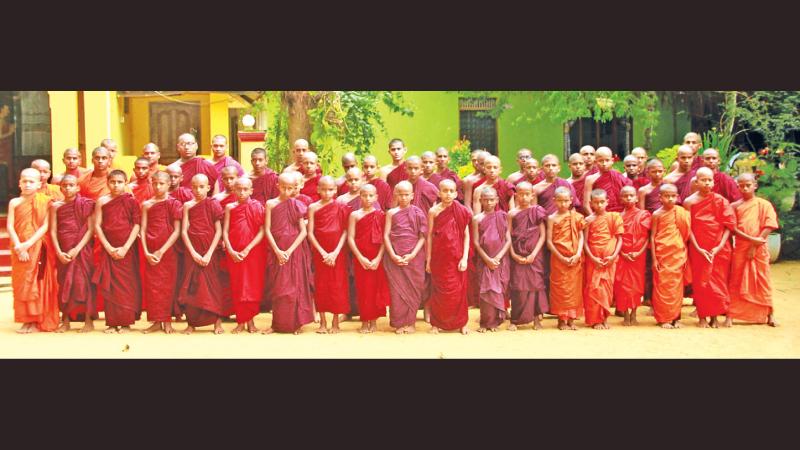
Deep in the heart of the Sabaragamuwa Province is a unique seat of learning, the Sri Somananda Pirivena in Bopaththa, Meennana.
English medium classes
It is only the second such Pirivena in the island to conduct classes in the English medium, the first being at Asgiriya in Kandy. The Pirivena is residential and many samaneras and bhikkhus have passed through its portals. 
The Sri Somananda Temple was established by Ven.Pathberiye Sri Somananda Nayaka Thera, Ven. Meneripitiye Chandrarathana Anunayaka Thera and subsequently, the Sri Somananda Pirivena was established by Rassagala Chandakiththi Thera on December 3, 2012 with two samaneras. This was the day on which the late Ven. Pathberiye Sri Somananda Nayaka Thera was cremated.
The aim of establishing this Pirivena was to spread the Dhamma globally through these samaneras who would one day pass out from this Pirivena as young bhikkhus.
Today, the pirivena has approximately 75 samaneras from all parts of the island and some other bhikkhus. This number includes three samaneras from Cambodia.
In 2017, the Sri Somananda pirivena gained government approval and the Government started paying the teachers’ salaries and also giving the textbooks. Today, the Sri Somananda Pirivena has the status of a semi-government institute of learning.

Ven. Rassagala Chandakiththi Thera is Nayaka Thera of the Sri Somananda Pirivena and Ven. Getamanne Seevali Thera is the Viharadhikari (Administrator) and oversees the functioning of the Pirivena. At present Ven. Gatamanne Seevali Thera is a student bhikkhu of the Buddhist and Pali University of Sri Lanka.
The Pirivena holds classes from Grades 1 to 13 (A/Ls). The Sri Somananda Pirivena has a library. The Pirivena autorities conduct Sinhala and English Dhamma schools too.
Well-disciplined life
It is a well-disciplined life for the samaneras. They are not allowed to use money, and mobile phones and are not permitted to waste time watching television.
Their day begins at the crack of dawn – 4.30 a.m. Then till 6.15 a.m. the samaneras learn and memorise gathas (stanzas). From 6.15 a.m. – 7. 15 a.m. it is household chores’ time breakfast from 7.45 a.m. to 8.15 a.m. A period of study starts at 8.30 a.m. and ends at 11.30 a.m. During this session the samaneras are tested on what they have learnt and memorised. Cleaning work and helping with things associated with the noon alms commences at 11.30 a.m.
The samaneras and bhikkhus have their lunch at 12 noon. Academic classes start at 1 p.m. and continue till 6 p.m. The Sinhala language is the only subject taught in Sinhala.
Another session of chores follows and at 7 p.m. Daily devotions end at 8.p.m.
From 8 p.m. to 9 p.m. these samaneras have to do exercise connected to Pirivena education under the supervision of a teacher.
Bedtime for the samaneras between the ages of 8-15 is at 10 p.m. while those above 15 years go to bed at 11 p.m.
Subjects
The samaneras learn subjects such as Mathematics, Sinhala, History and Science also Sanskrit, Pali and Buddhism.
At present, four bhikkhus and three lay teachers comprise the staff at the Pirivena.
Two of the samaneras will face the Pirivena exam equivalent to the G.C.E. O/L examination and another two will sit the same exam next year.
Ven. Bhodhagama Dhammadhewa Samanera Thera won the all-island first place in the Pirivena final exam.
The administration of this Pirivena organises many extra curricular activities such as meditation programs, classes, Poya day religious rites and also two pilgrimages each year.
Every night these samaneras learn Thripitakaya as well.
The provision of food for a large number is a major issue. Forty-five kgs of rice is needed per day. Various donors or dayakayas have been allotted specific days for providing alms and the 365 days of the year is covered in this manner. However, according to Pirivena sources currently there is a lessening in the daily provision of alms due mainly to the current economic situation in the country. On such days the pirivena administration has to provide the meals.
Dry rations
If anyone wishes to lend a helping hand it will be much appreciated. If you want to give alms you should give dry rations. Anyone who wishes to help educate these samaneras can also join the Kapakaru Maapiya Kramaya scheme and sponsor a samanera’s education.
The Sri Somananda Pirivena has limited accommodation and it is insufficient to meet these samanera’s daily needs. And they have limited infrastructure facilities as well.
The Sri Somananda Pirivena contributes in no small measure to the development and propagation of Buddhism and the Pirivena deserves every encouragements and help.
Nira Diaz and Mihi Deegodage

